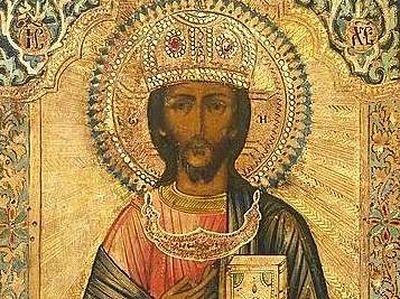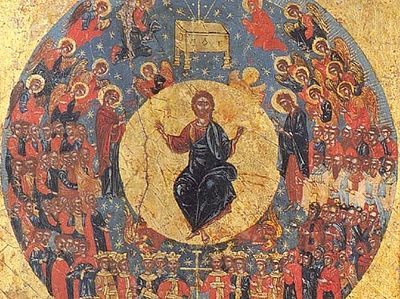
There are three Hebrew words which the first century church used often in their worship, and we have retained only two of them. These Hebrew/ Aramaic words were so important that they were carried bodily and untranslated into the worship of the non-Hebrew Gentile churches, where they functioned not as Hebrew words but as international Christian ones. All Christians today use two of them every time they worship. They are: “amen” and “alleluia”. Strictly speaking, the first word means “so be it” (coming as a congregational response to a prayer uttered by the celebrant), and the second means “praise Yah” (“Yah” being short for “Yahweh”, the Name of the God of Israel). The first still functions as the congregational response to a prayer uttered by the celebrant (or maybe to the last clause of the prayer, if the prayer is said silently). The second now functions as an acclamation, a cry of praise and adoration to God. But the third Hebrew word, habitually used in the first century church, we do not use at all. It is the word “maranatha”, Aramaic for “our Lord, come”. St. Paul, writing in Greek to the Corinthians, uses it at the conclusion of his letter (1 Corinthians 16:22), evidently assuming that they would recognize the word and know what he was talking about. They might have been Gentiles, but they still knew such good Hebrew words as “amen”, “alleluia”–and “maranatha”.
This reveals that the first century church, both Jewish and Gentile, lived in the light of the Second Coming, and that they lived as a people waiting for their Lord to return and for the world to end. This expectation was not (as is sometimes said by some) a matter of calendar, as if the apostles taught that Jesus’ Second Coming was about to occur in a couple of decades or so. St. Paul explicitly said that the Second Coming could not occur while the Roman Empire was still intact (see 2 Thessalonians), and the Roman Empire was looking pretty intact throughout the first century. Rather, the imminence of the Lord’s Return was not a matter of human calendar, but of divine agenda.
God had a number of things on His salvific agenda, His “to do” list: the call of Abraham and the patriarchs, then the creation of His people Israel, then their liberation from Egypt, then their conquest of the Promised Land, then (after the Babylonian Captivity) their restoration to that Land. Then the birth of the Messiah, and then His death, resurrection, and ascension, and then the outpouring of the Spirit and the Gentile mission. And then, as the very last item on the list, the Second Coming and the consummation of all things. Everything had been accomplished but that last item, and that could come more or less at any time. That was why St. Paul wrote that the ends of the ages had come upon them (1 Corinthians 10:11), and that the Lord was at hand (Philippians 4:4). That was why St. James said that the Judge was even then standing at the very doors (James 5:9), and why St. John said that it was the last hour (1 John 2:18). They were not mistaken about timing, like children on a long journey constantly asking, “Are we there yet?” Rather, they were ready for it, whenever it came.
What does it mean to live in readiness for the Second Coming? It does not mean that we live in a state of high anticipation, waking up each day excited and expectant (and going to bed each night correspondingly disappointed that today was not the day). Rather it means that we sit lightly on the things of the world, with a spirituality and an approach to life appropriate to people who are ready to leave this age behind at any moment.
Our Lord counselled such an apocalyptic spirituality when He warned His disciples that Jerusalem would be destroyed within a generation. Most Jews in His day believed that God would never allow the Holy City to be destroyed, and they were determined to wait out any siege of the city and hunker down for the long haul. That, Christ said, would be a fatal mistake. They must sit lightly on the world they knew, for the Romans were about to sweep it all away into the dustbin of history. He then told a parable about the spirituality they would need, about how a man must be ready to flee at a moment’s notice, with all the urgency of Lot fleeing Sodom. “Let him who is on the housetop not go down to take what is in his house; and let him who is in the field not turn back to take his cloak” (Matthew 24:17-18, Luke 17:31). No time to stop and load up the world’s goods, no time to “just grab a few things”. One must sit so lightly on this world that one can leave it all behind at a moment’s notice. That was necessary counsel for those awaiting for Jerusalem to end in the first century, and it is necessary counsel for all Christians now.
St. Paul, of course, said the same thing: “The time has been shortened; from now on, let those who have wives live as though they had none, and those who weep, as though they did not weep, and those who rejoice, as though they did not rejoice, and those who buy as though they did not possess, and those who use of the world, as though they did not make full use of it, for the form of this world is passing away” (1 Corinthians 7:29-31). The upshot? Sit lightly on this world, and don’t give it your heart. Keep your heart in the Kingdom, where it belongs. Everything down here is passing away, and if you get entangled in the affairs of the world, you will pass away with it as well.
Such a spirituality and approach to life is especially needed today, when terrible events on the international stage might make one conclude that the world is spinning out of control. In fact the world is not out of the control, but Jesus still reigns over it from the right hand of God, and the world will end when and how He wills. The final word does not belong to Al-Qaeda, or to Russia, or the United States, or to any of the children of men. The final word belongs to God alone. World events are important, but not ultimate, and we must not allow them to consume our attention, nor to let the fear which they can inspire fill our hearts. We sit lightly on the form of this world, looking not so much at the events of the world as through them, focussing upon the coming Kingdom. The rulers and generals, the terrorists and the politicians, all think that they know how history should unfold, and they are doing everything in the power to fulfill their plans to make that happen. We know how it will really unfold—with the last trumpet, and the voice of the archangel, and the resurrection of the dead, and the final triumph of Jesus, and the new Jerusalem descending out of heaven from God like a bride adorned for her husband. We know what others don’t. We know the word “maranatha”.




